France wants to control the situation in its foreign territories by mobilizing more than 600 police officers.
After days of serious unrest in the French overseas territory of New Caledonia, the situation eased slightly on Sunday. Several hundred police officers cleared the road from the capital, Noumea, to the international airport of the archipelago in the South Pacific on Sunday, French Interior Minister Gerald Darmanin said on Sunday. In the past few days, independence supporters have set up more than 70 roadblocks there using burnt out wrecked cars.
However, the road is currently not normally passable. French High Commissioner to the South Pacific archipelago, Louis Le Franc, said on Sunday that it could be days before the airport reopens. First, the debris must be removed from the street. According to Darmanin, many grocery stores have also been able to reopen their doors. But schools will remain closed until next Friday.
Airlines suspended their flights due to the unrest, in which six people were killed. Flights to and from New Caledonia have been suspended since Tuesday. The government said on Saturday that 3,200 people were stranded due to flight cancellations.
“Thanks to the forces at my disposal, we will be able to restore the republican system,” Le Frank said. According to him, the situation has calmed down compared to previous nights.
Given the unrest in New Caledonia, Interior Minister Darmanin recently announced the deployment of hundreds of security forces to French overseas territories on Sunday. According to Darmanin, more than 600 police officers were mobilized to remove barriers on the airport road. This also includes about 100 gendarmes from a specially armed special unit, the Interior Minister announced on Saturday evening on the electronic platform X.
Protests against electoral law reform
The protests, in which cars were burned and looted, were sparked by a planned electoral law reform, which will allow French people to participate in regional elections in New Caledonia if they have lived there for at least ten years. The indigenous Kanak population fears that this will reduce their influence and hopes of establishing their own state. The National Assembly in Paris approved the reform of the electoral law, but President Emmanuel Macron has not yet signed it. His government says the reform will guarantee democratic principles in elections.
The conflict in New Caledonia has been raging for decades. About 41 percent of the population of about 270,000 are indigenous Kanaks, and 24 percent have European – mostly French – roots. In three referendums held in recent years, those who voted voted against independence from France. (APA/Reuters/AFP)

“Food practitioner. Bacon guru. Infuriatingly humble zombie enthusiast. Total student.”








More Stories
Kyiv: Russian Kursk offensive halted
US Presidential Election: Former US Government Officials Warn Against Donald Trump's Election
Netherlands wants to leave asylum system